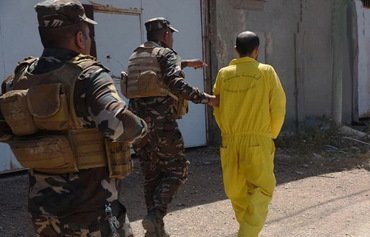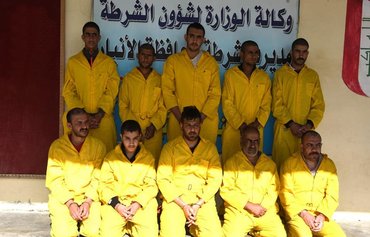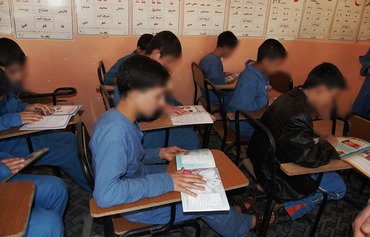Thousands of "Islamic State of Iraq and Syria" (ISIS) elements have been arrested on terrorism charges since 2014, and have since faced trial and sentencing via the Iraqi court system.
These arrests have been conducted in accordance with legal procedures, and in compliance with international human rights standards, Iraqi officials said.
Arrests follow the issuance of a warrant from a judge after a report is filed, or are made after an individual is "caught in the act" while attempting to carry out a terror attack, Legal Culture Association head Tariq Harb told Diyaruna.
Detainees are interrogated about the crimes they are accused of committing, and about related details such as location and accomplices, he said.
"After documenting the testimony of the accused and that of witnesses and complainants, the criminal court takes over and further investigates the charges and evidence and issues a verdict," Harb said.
Delay in reaching a verdict in some cases is due to a host of factors, he said, including "the accused being implicated in several crimes and at different locations or having other co-conspirators or partners".
In these cases, a longer investigation is required, he said.
Iraqi law handles terrorism cases with a high degree of responsibility to "ensure that justice is served for the victims and that innocent individuals are not falsely accused", Harb said.
"Everything follows legal procedure, starting from making an arrest and conducting interrogation, all the way to issuing a final verdict and sentencing," he said.
"Those who are arrested on terrorism charges number in the thousands," he said, noting that they are held in fortified prisons and "are treated in accordance with international human rights principles and standards".
"Nearly 100 people were executed this year after conclusive evidence convicted them on murder charges," Harb said.
Tight security at prisons
Around 2,300 detainees are being held in Anbar on terrorism-related charges, said Anbar provincial council security committee chairman Naeem al-Koud.
The convicts are taken to maximum security prisons, he told Diyaruna, where there are stringent security procedures in place "to secure these prisons and fight corruption".
"When we visit any prison we find tight security measures, and inmates are treated well and have access to a variety of rehabilitation programmes," he said.
Vocational workshops and training courses are available for inmates, he said, noting that they receive religious guidance that seeks to correct their misguided thinking.
Anbar's appeals court includes committees that work on terrorism-related cases comprised of judges, investigators and intelligence officials who question all detainees about the crimes for which they stand accused, al-Koud said.
After the detainees are charged, "they are transferred to the courts to get a fair trial", he added.
Ninawa province police say they have arrested about 2,000 individuals on terrorism charges.
Operations to hunt down and arrest ISIS elements are "strongly supported by the local population", Ninawa provincial council security committee member Hassan Shabeeb told Diyaruna.
"Civilians are leading the security forces to ISIS locations," he said, noting that co-operation between the civilian population and the Iraqi forces is stronger than it was before the ISIS incursion in mid-2014.
"Now we are facing a new reality, where civilians and security forces are standing side by side in the same trench against terrorism," he said.

![Members of ISIS's so-called "Wilayat Diyala" who were arrested by Iraqi forces are seen in this file photo from September 2016. [Photo courtesy of the Iraqi Directorate of Intelligence]](/cnmi_di/images/2018/12/21/15741-Iraq-Diyala-ISIS-600_384.jpg)






